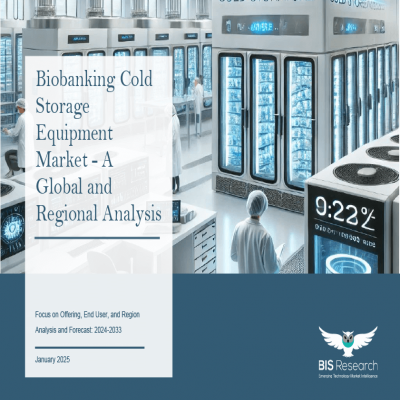A quick peek into the report
Biobanking Market - A Global and Regional Analysis
Focus on Product and Service, Storage Type, Sample Type, Ownership, Biobank Type, Application, Country, and Region - Analysis and Forecast, 2025-2035
Frequently Asked Questions
Ans: The global Biobanking market was valued at approximately USD 7.00 billion in 2023 and is projected to reach USD XX million by 2035, exhibiting a compound annual growth rate (CAGR) of approx. XX% from 2025 to 2035.
Ans: Major players in the global Biobanking market Becton, Dickinson and Company, QIAGEN N.V., Merck KGaA, Thermo Fisher Scientific Inc., PHC Holdings Corporation, Cryoport, Inc., Azenta, Inc. among others.
Trends:
• Integration of Digital Solutions: The incorporation of digital tools and software for data management, sample tracking, and automation in biobanking operations is a growing trend. This allows for better data accuracy, accessibility, and compliance with regulatory standards.
• Expansion of Precision Medicine: As the demand for personalized and precision medicine grows, there is an increased need for biobanks to store diverse and high-quality biological samples. These samples are essential for understanding genetic variations and developing targeted treatments.
• Use of Artificial Intelligence (AI): AI is being leveraged for improving biobanking operations, such as enhancing the analysis of biological data, automating sample sorting, and predicting disease outcomes based on sample data.
• Collaborations and Partnerships: Increased collaborations between biobanks, research institutions, and pharmaceutical companies are becoming more common to drive innovation in personalized medicine and drug development.
Driver:
• Growing Demand for Personalized Medicine: With the rise of personalized medicine, the need for precise and well-preserved biological samples has surged. Biobanks are pivotal in storing and providing these samples for the development of tailored therapies and treatments.
• Rising Prevalence of Chronic Diseases: The increasing rates of chronic diseases such as cancer, cardiovascular diseases, and neurological disorders are driving the need for more extensive research and, consequently, a greater demand for biological samples to understand disease mechanisms and improve treatment.
• Advancements in Genomics and Biotechnology: Technological advances in genomics, proteomics, and biotechnology have propelled the demand for high-quality samples, further pushing the growth of the biobanking market.
• Government and Institutional Support: Governments and research institutions are increasing funding and support for biobanks, recognizing their importance in advancing healthcare research, improving disease prevention, and developing new therapeutic strategies.
• Ethical and Regulatory Concerns: Issues related to informed consent, data privacy, and the ethical use of biological samples present significant challenges. Strict regulations around the storage and use of human biological samples, particularly genetic data, require biobanks to adhere to complex compliance standards.
• Standardization of Biobank Practices: There is a lack of global standards for sample collection, storage, and processing. Variability in sample handling can affect the reliability of research findings, making standardization a key challenge in the industry.
• High Operational Costs: Maintaining biobanks requires substantial investments in infrastructure, including storage facilities and advanced technologies, as well as ongoing operational costs for sample management and quality control.
• Shortage of Donor Samples: While there is a growing need for diverse biological samples, sourcing them in a manner that complies with ethical and legal standards remains a significant challenge for biobanks.
• Expanding Biobank Networks: There is a significant opportunity to expand biobank networks globally, especially in emerging markets where research infrastructure is developing. This would support worldwide access to biological samples and enhance international collaborations.
• Adoption of AI and Automation: Implementing AI, machine learning, and automation in biobanks presents opportunities to improve sample management, enhance data analysis, and reduce operational costs, ultimately improving efficiency and scalability.
• Increasing Collaboration with Pharmaceutical Companies: Biobanks can leverage partnerships with pharmaceutical companies for drug discovery and clinical trials. This is a major opportunity as pharmaceutical companies rely on high-quality biological samples to develop new medications and therapies.
• Development of Digital Biobanks: As digital health technologies continue to evolve, there is an opportunity to develop digital biobanks that provide easier access to data, facilitate remote research collaborations, and store biological samples in a virtual, data-driven environment.

